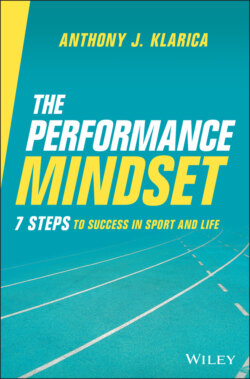Читать книгу The Performance Mindset - Anthony J. Klarica - Страница 16
Attitude nurtures talent
ОглавлениеAsh's doubles partner at the 2021 Tokyo Olympic Games, Storm Sanders, experienced a very different path to realising her goal of representing Australia. Storm was not a junior slam winner. Of the four junior slams she did play, including two in Australia, she had a best result of third round. Due to a limited number of junior tournaments her best junior ranking was 55. Storm grew up about an hour from Perth playing a variety of sports, including soccer, gymnastics and surfing, as well as different sports at school. ‘I never got selected for a state team, as I was only about the fourth or fifth best in Western Australia. I didn't win things or get sponsorship as a junior,’ she reflected when I interviewed her.
‘I honestly don't believe I have that much raw talent,’ Storm said. ‘My talent is to stick to everything I do and commit, day in day out. It ended up helping me because I realised I had to go about it my own way. For three years I set my alarm and regularly got up at 5 am, caught the train an hour into Perth to practise in the morning, then back home to get to school, and repeat in the afternoon. If my parents drove me, it still took 45 minutes each way. I recognise now I was behind in my tennis development, especially because I didn't play as many tournaments as others due to my circumstances. As a result of this I developed more mental skills than my peers at that time. I think it enabled me to have a career and a lot of the other people ahead of me then have now stopped.’
Storm's attitude ultimately assisted her career progression. ‘I remember going for a hit with a junior male player during the Hopman Cup in Perth when I was 15. It was super‐hot, but we kept working through the session. Because of the timing, a few courts down former player and now coach Nicole Pratt was working with Australian player Alicia Molik. She must have noticed us because she came over to speak to me when they finished. She was impressed with how I went about it. There was no coach there. I was running my own session, being independent. She said she was so impressed with my attitude that she would like to help me. I got invited to go to Melbourne for a week to hit and the following year I was invited to an academy there and moved to Melbourne. I had just finished year 11 in Perth, but once in Melbourne I made sure I finished year 12.’
The transition wasn't smooth. After several challenges, including injuries that forced her out of the game for almost a year, and with no ranking in 2018, Storm is now ranked about 120 in the world in singles and 30 in doubles. She has built her game back on the foundation of doubles and in 2021 made the Wimbledon doubles semifinal and US Open doubles quarter‐finals, and represented Australia at the Olympics and the Federation Cup (now the Billie Jean King Cup). She began competing in singles again in 2020, effectively starting her singles career in her mid‐twenties. It's a career that wasn't built on talent, but on mindset. Ash Barty's and Storm Sanders’ stories also reflect the variety of pathways that a sporting career can take. They can be unpredictable, with twists and turns and different talent bases. Using supports, patience and a determined resolve were key mindsets for both athletes that enabled them to advance.
